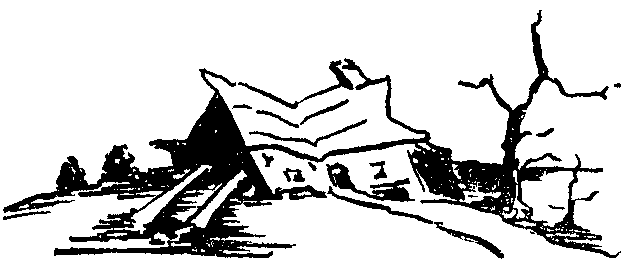
In the spring of the year one is urged to take a drive along some of the so called "back roads." Here we see Nature bursting with new growth. Everything around us seems to have that fresh new look, yet we round a turn in the road and come upon a scene that appears out of place in all this newness. It is an abandoned house badly in need of repairs. The house seems to tilt at an odd angle and someone has placed logs against it to help hold it up. Looking more closely we find that the sill or foundation having given way in one or more places has caused the house to sag and become unsafe. If nothing is done to renew the foundation, it is obvious that sooner or later even the props will fail to hold and the entire house will collapse.

As we pause there awhile, wondering at the neglect and apparent disharmony with the surroundings, a thought steals into our mind. "Can this be at all symbolic of ourselves? Have we, as we go about our daily living, relied too much on props in our search for happiness and peace of mind?" In turning to external things for our enjoyment of life, perhaps we have been merely putting 'props against the old house.' These external sources of pleasure rarely carry us through more than a few days, and then we are forced to seek new things to satisfy ourselves. This constant search for pleasure from external things becomes like a drug, and it is hard to break the habit. We are forced to conclude that perhaps we have neglected the foundations of real happiness, and will soon find that our entire 'house of harmony' and peace of mind may collapse at the first storm that beats upon us.
We pause a little longer in this setting and wonder what it is that really counts — from what source have we found real peace of mind? What are some of the things that have made lasting impression on us and given a real sense of pleasure? The smile and word of thanks for some small favor done freely, a good book, the sunset reflected in the calm surface of a lake, music we have heard, a small piece of furniture we made ourselves. Why do these particular things and events make us truly feel better than some of the purchased pleasures we have indulged in? In each case the thing which counted most called for something within us either to appreciate or create, called for some imagination and thought on our part. They appealed to the heart rather than the brain part of us, and in most cases we had to do the job of finding the pleasure rather than having it thrust upon us from the outside.
Turning our thoughts from the propped-up house to the surrounding scene a sense of calmness spread through our entire being. Here is constant growth and yet in an unhurried fashion — no rushing, no seeming conflict. Each plant, each tree receiving its food from Mother Earth and growing in its assigned pattern. We look at a large tree perhaps hundreds of years old and think of the storms it has withstood. Our eyes travel further along and we see a fallen tree. We examine this one more closely and find that its core had become rotted so that it had lost its strength and thus could not withstand the stresses imposed upon it by the external storms.
Could this also be a story told by Nature for us? Inner strength is required to withstand the storms and stresses of living in order to attain full growth, and if inner decay occurs at any time during the growing process full maturity will not be reached. Some people are able to weather any kind of mental or physical storm while others wilt at the first small blow. Some, then, must have a philosophy, acknowledge of the purpose of living that gives strength to the inner man to carry him through any storm.
As we leave the scene of the propped-up house in its setting of new life we carry away the idea that for true happiness, peace of mind and strength, we need a firm foundation built from within ourselves. The materials for such a foundation have been handed down through the ages by teacher after teacher. If these ingredients, however, are not thoroughly mixed in one's character by application they, like any other form of guidance, are soon forgotten and the foundation becomes weak and unable to support its load when adverse conditions are applied.
(From Sunrise magazine, November 1951; copyright © 1951 Theosophical University Press)
Words are good, but there is something better. The best is not to be explained by words. The spirit in which we act is the chief matter. Action can only be understood and represented by the spirit. No one knows what he is doing while he is acting rightly, but of what is wrong we are always conscious. — Goethe